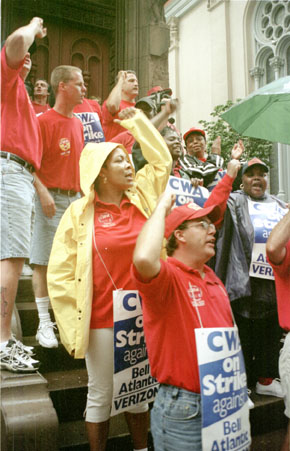Phone workers gain in strike at Verizon
Workers strengthen union rights in fight for contract
 | | Militant/Angel Lariscy | |
Striking phone workers rally in Philadelphia August 18. Unions emerged victorious from two-and-a-half-week strike against Verizon, boosting efforts to organize workers in wireless division and winning wage increases and other concessions.
|
BY BRIAN WILLIAMS
Through a militant strike against telecommunications giant Verizon, some 86,000 workers, from Maine to Virginia, emerged victorious after two and a half weeks. The gains won have put these workers in a better position to continue the fight to strengthen their unions and assert their right to improved working conditions and dignity on the job.
A tentative settlement was announced August 20 by officials representing the two striking unions--the Communications Workers of America (CWA) and the International Brotherhood of Electrical Workers. The agreement ended the walkout for some 50,000 of the workers, primarily in the New York and New England areas.
Three days later the company and union representatives reached agreement on several outstanding issues, providing further concessions to the union and clearing the way for the remaining 36,000 workers to get back to their jobs.
Workers won a central demand in their strike--removing obstacles to the union's ability to organize the fast-growing wireless division of the company, where currently fewer than 50 of about 32,000 employees are union members.
The new agreement allows for "card checks," where potential members indicate their desire to join simply by signing a card. Once 55 percent of the workers in a shop sign up, the union can be recognized.
The unions also won the right for their members to install the high-speed Internet access for customers who sign up for Verizon's Internet services. Much of this work had been previously done by nonunion contractors.
The three-year pact provides for a 12 percent wage increase and 14 percent raise in pension benefits. It significantly limits Verizon's ability to force workers to relocate to other jobs within its 12-state area. No more than 0.7 percent of the workforce would be required to transfer in any given year. Verizon's original proposal was to be able to transfer up to 10 percent.
"The concessions by Verizon are the largest and most public victory for the CWA so far at a high-tech company," noted an article in the August 22 Financial Times of London. Verizon is the largest provider of local and wireless telephone service in the United States.
"There was a lot of tension" on returning to work, stated union militant Rob Anderson, who spent five hours in jail the previous week after being arrested for "jeering" at one of the managers.
On a picket line in New York, Bob Hines, a cable splicer for 30 years and president of Unit 22 of Local 1300 in Pennsylvania, described some of the conditions the workers face daily. "Service representatives who need to use the bathroom have to raise their hands" for relief in their work station. "Then they have to enter a code into the computer that sets the time when they left their station, and sometimes the supervisor will follow and time you in the bathroom."
The new pact provides operators and customer service workers up to five 30-minute periods each week in which they can do work other than taking calls.
Mandatory overtime was the main issue over which 36,000 of the unionists remained on the picket for an additional three days. The agreement reached August 23 permits the company to require customer service representatives to work as much as 7.5 hours of overtime a week, down from as much as 15 hours. Other union employees' overtime will be capped at 10 hours a week now, and 8 hours in January. Verizon also conceded a bilingual salary differential, in which workers who do jobs that require more than one language will receive 3.5 percent more pay.
The solid strike was an inspiration to some of the union's newest members as well those with many years at the company. In Philadelphia, Charise Smith, a business consultant for 10 months at Verizon who had never before been in a union, commented, "When we went out together that first day, I realized it was for a good cause. I realized we did have power and that the union means something."
Laura Anderson in New York and Nancy Cole in Philadelphia contributed to this article.
Related article: Harris joins Pittsburgh phone workers' picket
| 



